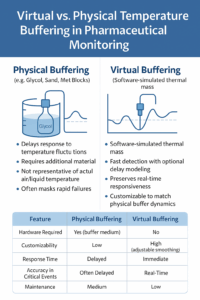The Drug Supply Chain Security Act (DSCA) mandates full supply chain traceability for prescription drugs dispensed in the US in an effort to prevent counterfeit or adulterated drugs from entering market. Serialization is a road map for this mandate. Simply put, serialization is the assignment of unique, traceable information to the individual salable unit.
Pharmaceutical serialization creates massive data
While creating massive amounts of vital serialization data, individuals responsible for mission-critical serialization infrastructure may be “missing the boat” in preventing and tracking an equally if not more lethal form of adulteration to biopharmaceuticals. Loss in potency due to temperature abused biopharmaceuticals and inadequate acquisition of track and trace monitoring data during distribution logistics could result in the marketing of adulterated biopharmaceuticals.
Are we forgetting about cold chain data?
The value of serialization technology for tracking individual salable unit data without tracking temperature for each salable unit of sensitive biopharmaceuticals is the weak link in the effort to develop serialization technology for preventing comprehensive pharmaceutical adulteration.
A drug that is temperature abused is just as dangerous as drug diluted with counterfeit.
Allowing temperature-abused biopharmaceuticals to traverse the health care and logistics distribution chain without the same assurances proposed by serialization could pose more of a threat than counterfeit drug products in distribution. Why? Exposure to increasing climatic and environmental temperature changes diminishes potency for fragile biopharmaceuticals and vaccines that are unknowingly exposed to risky temperatures. Pharmaceutical potency failure is real, could lead to a false sense of security and immunity to communicable disease, causing further proliferation of infectious diseases such as influenza.
“Vaccine shipping date and ambient temperatures were significantly associated with reduced vaccine effectiveness”
Pharmacy Times, September 16, 2016 reports that: “exposure of some live attenuated influenza vaccine (LAIV) lots to heat during US distribution may explain its poor performance in 2013–2014. Vaccine shipping date and ambient temperatures were significantly associated with reduced vaccine effectiveness. LAIV lots shipped between August 1 and September 15 or unloaded at distributors at a time when outdoor temperatures exceed 84 degrees Fahrenheit, (29 degrees Centigrade) were more likely to have reduced vaccine effectiveness.”
– See more at: http://www.pharmacytimes.com/…/why-live-attenuated-influenz…
Real-time cold chain monitoring is not a luxury but a necessity
Are we missing the boat on preventing an equal if not more lethal form of potential pharmaceutical adulteration, temperature abused biopharmaceuticals and vaccines? Advanced cold chain technology is here. Real-time data analytics, centralization and acquisition of real-time pharmaceutical temperature sensitive data and real-time actionable alerting are available as a cloud-based enterprise IoT platform which is neither mandatory nor enforced for monitoring certain critical distribution activities.
Cold chain tracking of individual pharmaceutical salable units
Developing a “fusion” of serialization technology with cloud-based enterprise IoT monitoring platform to provide surveillance of the smallest unit in distribution is a most compelling reason for preventing both adulteration from both loss of potency due to temperature abuse and counterfeit of biopharmaceuticals in distribution.
Written by Gene Ioli


